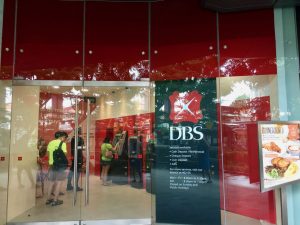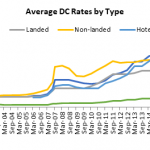DBS launches Singapore’s first SORA-pegged business property mortgage loan
- SORA-pegged business property mortgage loan provides business property owners with more property financing options amid challenging economic outlook
- SORA-pegged business property mortgage loan marks milestone in nation’s interest rate transition roadmap towards adoption of SORA as main interest rate benchmark for SGD financial markets
 DBS on September 3rd, announced the launch of SORA-pegged business property mortgage loan, Singapore’s first business property mortgage loan referencing the Singapore Overnight Rate Average (SORA).
DBS on September 3rd, announced the launch of SORA-pegged business property mortgage loan, Singapore’s first business property mortgage loan referencing the Singapore Overnight Rate Average (SORA).
The new SORA-pegged business property mortgage loan package provides business property owners with additional property financing options and covers all property loan types. It also marks another milestone in Singapore’s transition towards the adoption of SORA as the main interest rate benchmark for SGD cash and derivatives market.
Specially tailored for SMEs looking to finance their commercial and industrial properties, SORA-pegged business property mortgage loan will be available from 3 September 2020. Interest rates on the SORA-pegged Business Property Loan will be based on the 3-Month Compounded SORA published by the Monetary Authority of Singapore (MAS), as well as an applicable margin.
Joyce Tee, Group Head of SME Banking at DBS, noted that while demand for new business property purchases has dropped, the bank has observed a sustained interest among the SME community for property refinancing solutions amid the challenging economic outlook.
“DBS’ new SORA-pegged Business Property Loan affords SME business property owners the opportunity to refinance their property loans on more competitive terms. With the bank’s recent launch of various SORA-based products, we have also seen some interest among SME owners in SORA-pegged loans. With the industry moving towards a phased discontinuation of SIBOR and adoption of SORA, we are now giving business property owners the option of taking up a SORA-pegged package ahead of time to save them the hassle of repapering their loans down the road.”
SME business property owners can borrow up to 80% of their property value and choose to stretch their repayment tenor to up to 25 years.
Given SORA’s growing importance as a key interest rate benchmark in SGD financial markets, the new SORA-pegged Business Property Loan supports The Association of Banks in Singapore and the Singapore Foreign Exchange Market Committee (ABS-SFEMC)’s efforts to develop new SORA-based markets. It also complements the industry-led transition roadmap set out by the Steering Committee for SOR Transition to SORA (SC-STS).
Last month, DBS announced the agribusiness industry’s first SORA-based loan, as well as the industry’s first SORA loan coupled with an interest rate swap. In May 2020, DBS was also the first financial institution in Singapore to successfully price the issue of a SORA-referenced floating rate note.
Given SORA’s growing importance as a key interest rate benchmark in SGD financial markets, it supports the Association of Banks in Singapore and the Singapore Foreign Exchange Market Committee (ABS-SFEMC)’s efforts to develop new SORA-based markets. It also complements the industry-led transition roadmap, set out by the Steering Committee for SOR Transition to SORA (SC-STS).
On 30 August 2019, ABS-SFEMC announced that the discontinuation of the London Interbank Offered Rate (LIBOR) would affect the sustainability of the SGD Swap Offer Rate (SOR) and held a public consultation on the use of SORA as the new interest rate benchmark to replace SOR. More recently, the Steering Committee for SOR Transition to SORA (SC-STS) published the response to feedback on 19 March 2020, together with a roadmap for the transition. SORA is a transaction-based interest rate benchmark underpinned by the SGD overnight interbank funding market and has been published by the Monetary Authority of Singapore since July 2005.
The SORA-based loan facility’s interest rate, which references SORA, comprises two components: (1) a compounded daily SORA rate calculated in arrears and (2) an applicable margin.
SORA is a backward-looking overnight rate as compared to forward-looking reference rates commonly used for loan facilities in Singapore, such as the SGD Swap Offer Rate (SOR) where the interest rate is determined at the start of the interest period. To determine the interest rate of a SORA-based loan facility, the daily SORA rates are compounded in arrears and the interest rate is determined by the end of the relevant interest period.
Earlier this year, DBS was the first financial institution in Singapore to successfully price the issue of a SORA-referenced floating rate note.
How the 3-month Compounded SORA package works
MAS publishes SORA for a given business day in Singapore by 9.00am on the next business day in Singapore. Alongside SORA, the Compounded SORA rates for the 1-month, 3-month and 6-month tenors are also published.
The OCBC 3-month Compounded SORA Package will reference the 3-month Compounded SORA rate, published by MAS, to compute the monthly loan instalment. The rate will be updated every month instead of every three months as is the case for the 3-month SIBOR-based home loan.
The first applicable 3-month Compounded SORA rate will be the one published by MAS on the date that the bank disburses the loan, and will apply for a period of one month. If the 3-month Compounded SORA is less than zero, zero will be applied.
For each subsequent 1-month period, the applicable 3-month Compounded SORA will be the rate published by MAS on the first day of the 1-month period (rate review date) and will apply for such subsequent 1-month period.
This provides certainty to the customer as the customer will be notified at the start of the month of the applicable interest rate and instalment amount that will be charged at the end of the month. This arrangement helps the customer better plan his or her finances.
The 3-month Compounded SORA rate applicable on a Saturday, Sunday and Public Holiday would be the last published 3-month Compounded SORA rate. For example, if the rate review date falls on a weekend, the 3-month Compounded SORA rate applied for the next 1-month period would be the 3-month Compounded SORA rate published on the working Friday of that week.







